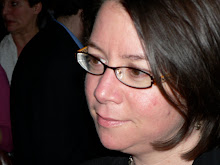The first week he was here we visited five oncologists to try and form a treatment plan: two medical oncologists (those are the chemo doctors), two radiation oncologists, and one surgeon. Each of them suggested a different course of treatment. The only unanimity was that surgery would not be any use, because the cancer was too widespread (not only deep into the tissue of his esophagus, but also in his bones, liver, and lymph nodes). We came to realize that for Dad there was really no right answer, or put another way, no wrong answer. The argument for radiation treatment was that it would be short, localized to the major problem area, and not hard on your whole body at once the way chemo is. The argument for chemo was that it treats all the cancer everywhere in the body. The side effects of either were expected to be manageable.
Dad liked the radiation plan better and we would have started the radiation treatment right away, but in that same first week (four days after he arrived here), Dad’s throat closed completely so that he could not swallow anything at all. This was both uncomfortable (he couldn’t swallow his own saliva and needed to retch it up often) and urgently dangerous (he had no way to take in fluids or nutrition). We scheduled a feeding tube insertion for the following week, and brought him to urgent care every other day to get fluids and sometimes glucose. What with the oncologist consultations and the urgent care visits, I did a lot of coloring.
At the beginning of the second week that Dad was here, he was supposed to have the feeding tube inserted, but unfortunately his throat was closed so completely they couldn’t do the procedure (it normally involves snaking a 1-mm endoscope down your throat). They checked him into the hospital, expecting to insert the feeding tube with a different and more invasive surgical procedure. The boys came and made come-home-soon signs, and played chess.
Instead of the anticipated surgery, we wound up choosing for Dad to get IV nutrition at home. At the end of that week he started the IV nutrition, and started having nurses visit him at home almost every day to monitor his various medical needs.
During this period Dad’s primary reaction to his illness was bewilderment. He could hardly believe how sick he was – he had been taking good care of himself and monitoring his health actively for many years, including regular doctor visits and blood tests, and yet there was no warning of this extreme condition. He was also bewildered (and annoyed) by the uncertainty of his situation: no one could tell him how long he had, or what symptoms he was likely to develop, or what exactly a particular treatment would accomplish if anything. But we traipsed together to all of his doctor appointments, and weighed his options, and made the best decisions we could.




No comments:
Post a Comment